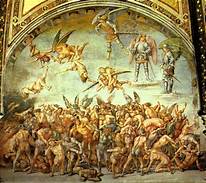Software not Hardware


My friend Chuck Missler used to carry around with him an ordinary floppy disc, capacity 1.44 Mbytes. When weighed, the small plastic device weighted only 0.7 ounces. Chuck then suggested we load this storage device with software and weight it again. Lo, the full diskette weighs exactly the same—0.7 ounce! Nothing has been added but information.
Thoroughly proficient in computer technology, Missler understood not merely computer memory and disk space, but operating systems, programming languages, chips and devices. I have never met a man who was so intellectually gifted! He defied his audience to explain any computer by merely reading the operating manual. The treasure, he said, was not in the hardware but in the code programs read into the machine in advance. The real content (often requiring expenditures of thousands of hours of labor) was software, not hardware. The information content of a storage device was the result of rearranging geometry in the medium, not by adding something new.
We humans, body, soul and spirit, are at least two-thirds invisible and thus the real you is software not hardware. The hardware is in fact in need of an upgrade, Chuck suggested.
 Chuck wrote,
Chuck wrote,
“We understand that the nucleus of a hydrogen atom is on the order of 10^-13 cm., and that the radius of its electron's orbit is on the order of 10^-8 cm — a difference of 100,000 times. (If we were to make a model of that, making the nucleus the size of a pinhead, the electron would be a football field away!) Looking at this volumetrically, for every part of "matter," there are 10^15 parts of "non-matter"! (That's about the same ratio of one minute to a billion years!) The atoms which make up the molecules of all physical things are more empty than filled!
Just as the architecture of the software inside a computer cannot be inferred from observing its external behavior, neither can the architecture of our own internal software be adequately inferred from observing our behavior. The only way to comprehend the internal architecture is by consulting the Designer's handbook.
If I take a blank computer disk and weight it on a scale, it will weigh about 0.7 oz. If I spend hundreds of dollars and load it with over a million bytes of software, it will still weigh 0.7 oz. Software has no mass. Although it may be resident in a physical system, it has no mass of its own. It can even be transmitted through the airwaves.
(The mass of my current residence has a bit too much mass, but that's another problem altogether)
As we pointed out in our article last month, time is a physical property: it varies with mass, acceleration, and gravity. Therefore, since software has no mass, it has no time dimension of its own. The real "you" -- call it soul, spirit, or whatever -- is eternal whether you are saved or not. That's the problem. Where will you spend your eternity?” (KHouse.org)


A friend commented on this "hardware versus software" perception of reality. Hardware represents the body, and software is about the person who is soul and spiritual living dwelling in a physical container. My friend noted that parents, teachers, care givers, pastors and counselors invest most of their lives and resources in dealing with humans as hardware. The software being “saved to file” may be the final product but we don’t ordinarily have full file access privileges. Everyone of us interacts with other hardware items, which we call “persons,” not with floppy disks or thumb drives. We can't relate to invisible persons very well--those who forgot to wear their bodies when they came to a meeting for example. Another friend wrote me about the same time to tell me about a delightful weekend of quality time he had spent with his wife and six wonderful children. This friend relates superbly with his family demonstrating “chesed” or “loyal love” for each. He is not driven by career or social advancement and he appears very ordinary at first meeting. He pays less attention to the container and relates with the person inside. But clearly this friend understands treasures in earthen vessels, 2 Corinthians 4:7.
Vast Human Resources, billions of dollars of capital investment, much R&D, raw material and plain hard work have been invested in the advancement of our American way of life--mostly without reference to God. We ignore side effects, consequences, pollution, careful resource management, societal consequences. Life is short so movers and shakers tend to act expediently without regard for side effects or impact on others. The universal experience of every man is that we all are mortal and fragile.


![]()

The Eagle soars in the summit of Heaven,
The Hunter with his dogs pursues his circuit.
o perpetual revolution of configured stars,
o perpetual recurrence of determined seasons,
o world of spring and autumn, birth and dying
The endless cycle of idea and action,
Endless invention, endless experiment,
Brings knowledge of motion, but not of stillness;
Knowledge of speech, but not of silence;
Knowledge of words, and ignorance of the Word.
All our knowledge brings us nearer to our ignorance,
All our ignorance brings us nearer to death,
But nearness to death no nearer to GOD.
Where is the Life we have lost in living?
Where is the wisdom we have lost in knowledge?
Where is the knowledge we have lost in information?
The cycles of Heaven in twenty centuries
Bring us farther from GOD and nearer to the Dust.

Since we are mostly software, not hardware, the words of our Lord Jesus are more ominous than ever. Burning up a body, even a dead body, sounds horrendous, but the inner man is spirit and soul, immaterial. What about the person who refuses the grace and mercy of God altogether? No wonder J.I. Packer in a recent message urged his listeners to avoid hell no matter what. Shadrach, Meschach, and Abednego did just fine in the burning fiery furnace. (Daniel 3)
One powerful statement from Jesus should give us pause:
And Isaiah says,“...I say to you, My friends, do not be afraid of those who kill the body, and after that have no more that they can do. But I will show you whom you should fear: Fear Him who, after He has killed, has power to cast into hell; yes, I say to you, fear Him!
“Are not five sparrows sold for two copper coins? And not one of them is forgotten before God. But the very hairs of your head are all numbered. Do not fear therefore; you are of more value than many sparrows.” (Luke 12:4-7)
“For there is nothing covered that will not be revealed, nor hidden that will not be known. Therefore whatever you have spoken in the dark will be heard in the light, and what you have spoken in the ear in inner rooms will be proclaimed on the housetops.
“The sinners in Zion are afraid;
Fearfulness has seized the hypocrites:“Who among us shall dwell with the devouring fire?
Who among us shall dwell with everlasting burnings?”(Answer) He who walks righteously and speaks uprightly,
He who despises the gain of oppressions,
Who gestures with his hands, refusing bribes,
Who stops his ears from hearing of bloodshed,
And shuts his eyes from seeing evil:
He will dwell on high;
His place of defense will be the fortress of rocks;
Bread will be given him,
His water will be sure...Your eyes will see the King in His beauty;
They will see the land that is very far off...” (Isaiah 33:14-17)
From Romans 8:
“And if Christ is in you, the body is dead because of sin, but the Spirit is life because of righteousness. But if the Spirit of Him who raised Jesus from the dead dwells in you, He who raised Christ from the dead will also give life to your mortal bodies through His Spirit who dwells in you...” (Romans 8:10-11)

-T. S. Eliot
The dove descending breaks the air
With flame of incandescent terror
Of which the tongues declare
The one discharge from sin and error.
The only hope, or else despair
Lies in the choice of pyre or pyre-
To be redeemed from fire by fire.
Who then devised the torment? Love.
Love is the unfamiliar Name
Behind the hands that wove
The intolerable shirt of flame [1]
Which human power cannot remove.
We only live, only suspire [2]
Consumed by either fire or fire.
T. S. Eliot's poetry is complex and difficult. His love of paradox, his references to obscure classical sources and to personal experiences known only to Elliot and a few of his friends make his poems almost incomprehensible, but, in my opinion, they are worth whatever effort we're willing to give them. His insights are often startling.
Here, in this section of a much longer poem, [3] Eliot insists that we have but two choices in life: "fire or fire" --the fire of purification or the fire of perdition. We are "redeemed from fire by fire," saved from the fire of judgment by God's refining flame. But--and here is the thought that grabbed my attention--in either case, God's love is the consuming fire; it is the inferno of both heaven and hell.
Here I quote Thomas Hopko, an Eastern Orthodox theologian, who, it seems, would heartily agree: "The 'fire' that will consume sinners at the coming of the Kingdom of God is the same 'fire' that will shine with splendor in the saints. It is the 'fire' of God's love; the 'fire' of God Himself who is Love. 'For our God is a consuming fire.' For those who love God and who love all creation in Him, the 'consuming fire' of God will be radiant bliss and unspeakable delight. For those who do not love God, and who do not love at all, this same 'consuming fire' will be the cause of their weeping' and their 'gnashing of teeth.' Thus it is the Church's spiritual teaching that God does not punish man by some material fire or physical torment. God simply reveals Himself in the risen Lord Jesus in such a glorious way that no man can fail to behold His glory. It is the presence of God's splendid glory and love that is the scourge of those who reject its radiant power and light." [4]
Thus, the "fire" of hell may be but a metaphor for the torment of God's eternal love raining down on those who do not love him in return. MacDonald's old Scot, David Elginbrod, had a similar take: "Watever may be meant by the place o' meesery, depen' upo't...it's only anither form o' love shinin' through the fogs o' ill [5], and sae gart leuk [6] something vera different thereby." [7]
Now, I must muse a bit...
It occurs to me that this may be one reason we're called, as God's beloved children, to love our enemies and do good to them.[8] They cannot endure the awful torment of our affection. Love becomes a force they cannot bear.
There's a reflection of that "force" in the first Harry Potter book (the only one I've managed to read). Lily Potter, Harry's mother, so loved Harry that she impregnated her love into her son's skin (somewhat as God does when he pours his love into our "skin"). When Harry's opponent, Professor Quirrell, touched Harry to harm him, her love, the love that ennobled her son, shattered the professor.
Paul agrees: "Do not be overcome by evil, but overcome evil with good."[9]
DHR
[1] In Greek mythology, the "intolerable shirt of flame" was a shirt that Hercules' wife gave him that had been poisoned by the blood of a centaur. It drove him to throw himself onto a funeral pyre. Metaphorically, it represents "a source of misfortune from which there is no escape." The only choice is to be consumed by "fire or fire."
[2] "Suspire" means "to sigh sorrowfully."
[3] From "The Four Quartettes: Little Gidding."
[4] Thomas Hopko, The Orthodox Faith vol. 4 (Orthodox Christian Publications Center, 1981). To his quotation I must add George MacDonald's wonderful comment: "The fire of God is unlike its earthly symbol in that it is only at a distance that it burns. When we turn and draw near him it turns into comfort."
[5] fogs o' ill: our confusion about hell's "cruelty."
[6] sae gart leuk: so made like.
[7] From MacDonald's novel, David Elginbrod. Our concept of hell as a place of literal fire may be derived more from Dante than from the gospel. Material fire cannot afflict a spiritual being, so the "fires of hell" could well be symbolic. It's significant to me that our Lord's word for hell was Gehenna, not Hades, the usual word for the nether world. Gehenna was a geographical location, a valley located southwest of Jerusalem that was the refuge dump for the city. Early in Jerusalem's history it was set on fire and burned continually, producing billowing clouds of acrid smoke. To our Lord it represented a powerful symbol for hell as a "cosmic garbage dump," a place of ruined, wasted lives (Cf. Mark 9:43 et. al.).
[8] "But love your enemies, do good, and lend, hoping for nothing in return; and your reward will be great, and you will be sons of the Most High. For He is kind to the unthankful and evil" (Luke 6.35)
[9] Romans 12:21
DHR
David & Carolyn Roper
http://davidroper.blogspot.com
https://dhp.org/catalogsearch/result/?q=roper
References

![]()
Notes by Lambert Dolphin

Email is Welcome: Lambert
Lambert Dolphin's Place (Home Page)
900+ Recent Articles: Library Annex (Help Thyself. Free)
Original Web Site (1995)
Personal Testimony
A Glorious Church
I Sing the Mighty Power of God
Jesus, The Light of the World
